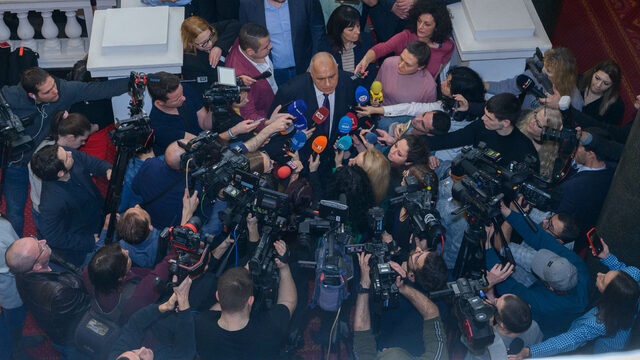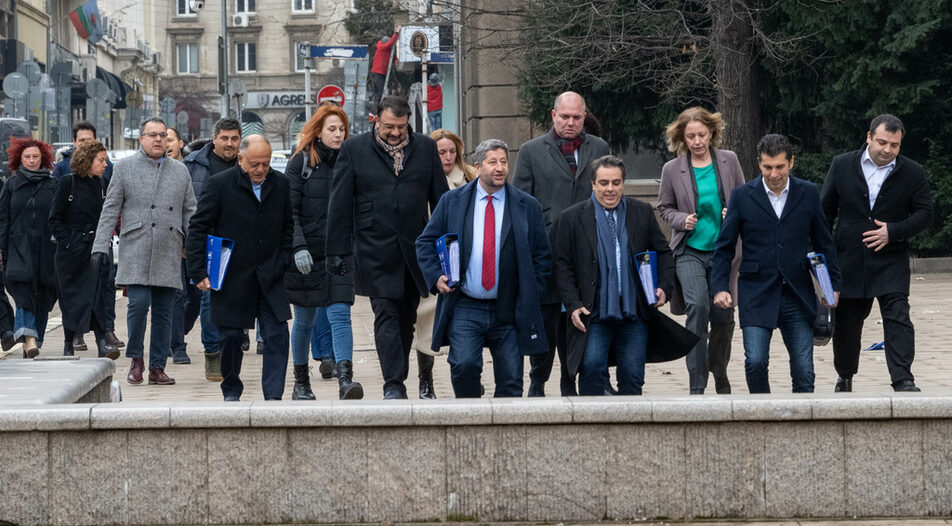Elections? What elections? You will be excused if you've forgotten that Bulgarians head to the polls on Sunday - many of them have likely done so, too, and some of them will likely shrug off the election altogether.
It is hard to blame them - this is the fifth parliamentary election in two years and the enthusiasm of the turbulent 2021 has waned. The anti-status quo parties such as WCC and TISP either fell apart or quickly blended with the mainstream, effectively losing their charisma.
Add to that the persistent tribalization of the country's politics, in which each party only pampers its already existing voter base and demonizes its opponents, and you can see why Bulgarian politics is in shambles and will likely remain so for the foreseeable future. Yet, what should we expect from the Sunday vote anyway?
No clear winner in sight
All polls from the past few weeks show a relatively consistent picture - five parties will certainly enter parliament, with the reformist coalition of ex-PM Kiril Petkov's WCC and Democratic Bulgaria taking a tiny lead in the last two weeks and GERB running close behind. It will be interesting to observe how the return of paper ballots will affect the score of Boyko Borissov's faction, which has been one of the major benefactors of controlled voting in the past - a practice severely limited by the introduction of machine voting in the summer of 2021.Both players have largely abstained from serious campaigning this time around. Their leaders and most recognizable faces roam around the country and throw long-distance punches at each other, but the zest of previous campaigns is absent.
In a classic manner, Mr Borissov first promised to back a WCC-DB "Euro-Atlantic" government if he loses, then went on to assure his voters he will certainly win and set the terms. What is certain, however, is that GERB will have a large enough quota in parliament to have a blocking (or enabling) minority when forming a government.
On the WCC-DB side, the new coalition missed the opportunity to capitalize on the new Magnitsky Act sanctions list. It even received a small (but not insignificant) blow over the US State Department 2022 human rights report, which underlined the illegality of Boyko Borissov's arrest in March of last year - something heavily exploited by pro-GERB supporters.
Three sets of threes: Three more certain entrants
There are no surprises with the third party, MRF, which, as usual, does not campaign in the national media, but only in the ethnically mixed regions containing its supporters. The movement will likely try once again to use its favorite method of behind-the-scenes politicking to get into the next governing format - formally or informally - but for now keeps a low profile.
As for the Russophiles from Vazrazhdane, they keep riding the wave of discontent over rampant inflation and benefit from the persistent cleavage on the topic of Ukraine, fueled by the mainstream parties and the President. So it won't be a surprise if they not only overtake BSP (almost certain by now) into fourth place, but also MRF.
As for BSP, its leader Kornelia Ninova's anti-gender ideology has further hurt its prospects - with the party likely to barely make it past the 7% mark. Yet, it might still have an important role to play, if there is any serious attempt for coalition-building. More on that below, but before that
Three parties on the threshold
According to all pollsters, there are three parties that remain just under the 4% mark - Bulgarian Rise of former caretaker PM Stefan Yanev, Slavi Trifonov's TISP (which, mind you, won the elections just 1,5 years ago - Sic Transit Gloria Mundi!) and the collection of leftist splinters from BSP, called The Left.
They are important because if any of them manages to enter Parliament (even with a minimal score), they might have crucial role in the creation of a wide coalition - whatever it is.
Mr Yanev proved in the last Assembly that he is more than willing to join any of the big parties. TISP now spews hate against everyone equally, with Mr Trifonov claiming simultaneously that the fight to oust GERB from power has stopped - and the WCC is "the other face of GERB". So for now, the only certain thing is that TISP will continue acting anti-systemically and promote its (new) cause for a Presidential republic. As for The Left, they appear to have no grand plans to rule with anyone and are focused on attracting BSP's electorate - likely in an attempt to either "steal" it altogether and establish themselves as the new Socialist force or to try to convince the BSP leadership to welcome them back in.

And three post-election coalitions
So, what's to come after the election? Pundits and academics foresee three different scenarios - and you might not be surprised by any of them.
First, it is a coalition of the two big parties, WCC-DB and GERB. It is safe to say that this would be highly unpopular for both sides, but especially with the more radical wings of the reformist parties, which still hope for Mr Borissov's arrest.
Yet, such a coalition ought not be excluded - DB co-chair Hristo Ivanov has already pointed in this direction, saying that GERB might turn out to be the only viable partner compared to the Russophile BSP and Vazrazhdane and the even more corrupt MRF. Also, Mr Borissov has toyed with the idea, as it will moderate WCC-DB's anti-corruption discourse, although it will be extremely hard for him to concede and support WCC of Mr Petkov, given it was he who tacitly arranged his illegal arrest last March. This would also require Mr Borissov's formal "retirement" from politics, which is a condition set by the reformist forces - and also something the longest serving modern Bulgarian PM would hardly accept.
The second possible option is for a minority cabinet led by either WCC-DB or GERB that is backed by the party that finishes second. It is obviously hard to imagine how this happens, either.
Which leaves us with the third option - a "Paper ballot" coalition of GERB, MRF and BSP, with the potential tacit support of Vazrazhdane. Although there have been signs that this is a possibility since the last parliament, the growing tensions along the pro- and anti-Russia line might render such a maneuver impossible to pull off.
And what is more - none of the big parties would like to enter an unpopular coalition just a few months before the Municipal elections. This applies equally to WCC-DB, which would aim to establish itself locally for the first time - and to MRF and GERB, which would like to keep their footholds and, respectively, networks of influence in the regions.
So, in short, strap up for a boring 2 April and a very heated summer after that.
Elections? What elections? You will be excused if you've forgotten that Bulgarians head to the polls on Sunday - many of them have likely done so, too, and some of them will likely shrug off the election altogether.
It is hard to blame them - this is the fifth parliamentary election in two years and the enthusiasm of the turbulent 2021 has waned. The anti-status quo parties such as WCC and TISP either fell apart or quickly blended with the mainstream, effectively losing their charisma.












